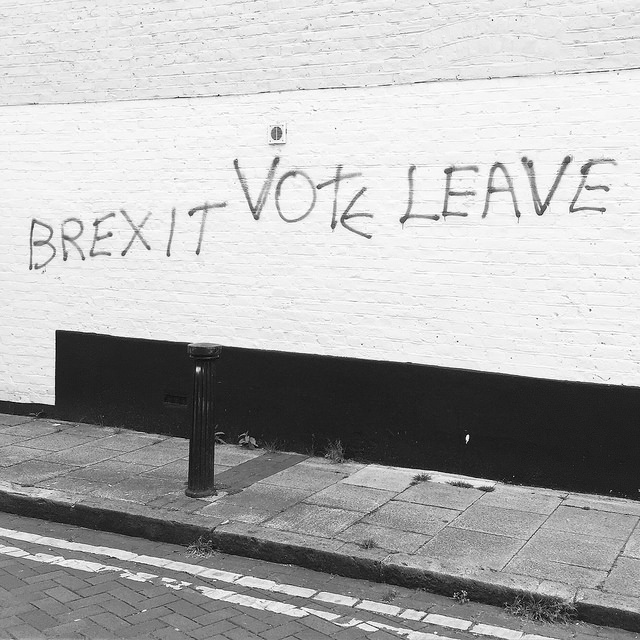For many of us in the UK the past few days have been painfully difficult. Among those who wanted to keep Britain in the EU, there’s been a sense of shock, shame, and anger — not least at our own complacency. But the prevailing mood might best be described as elegiac. What I’m experiencing both personally and collectively seems to be something akin to mourning.
This might sound overblown, sentimental perhaps, but the truth is that we are grieving, for our disfigured present and, more profoundly still, for the array of possible futures — individually, politically, nationally, transnationally — that now seem suddenly and irremediably lost to us. These are the dissolving horizons I find myself tracing each time I look at my four-month-old daughter. Right now it’s impossible even to imagine what future we’re bequeathing her.
Such grief, as it’s wont to do, breaks apart our capacity for language. In speaking to my friends over the last four days, in reading and sometimes finding solace in their myriad thoughts and reflections on social media, what strikes me most is the desperate, self-acknowledged futility of our words as we attempt to give coherent shape to what’s happened and is still unfolding, as we search for ways to accommodate the referendum result to the nation — the Europe — we know or want.
We need this grappling. Perhaps it’s cathartic. Perhaps it’s really all we can do at the moment. But, however we voted last Thursday, we also need to remember the damage that words can and have caused. In thinking about the 52 percent — the 17.4 million people — who voted to Leave the EU, it’s vital that we keep in mind Raymond Williams’s sage words: “There are in fact no masses,” he tells us, “but only ways of seeing people as masses.” If this message reminds us how toxic are the images of “immigrants” pedalled by the likes of Nigel Farage, leader of the UK Independence Party, then it should also caution us against simply caricaturing all Leave voters as xenophobes or racists. Nothing is to be gained by doing so.
Words have done real harm over recent months. The Leave campaign called on us to “Make Britain Great Again”. Britain was never “great”, or rather when it was “great” it was murderously so. But the Remain campaign wasn’t much better. In its incessant talk of “safety”, “jobs”, and “prices”, its corrosive negativity and refusal to think of “cost” in anything other than economic terms, it determinedly effaced the history and cultural complexity of the European project.
Since the result was announced, we have new problem words to contend with. Take “divorce”, for example, which been doing the rounds across the media. “Who’s going to handle the divorce negotiations?,” I heard one journalist ask an MP on TV yesterday. “What will Britain’s divorce from the EU look like?,” ponders the Financial Times. The metaphor of a broken marriage is a mistaken one, not least given that Britain will be leaving a union of 28 member states, but what should worry us is the narrative that it quietly and insistently imposes on past, present, and future: the endless bickering, the long and drawn out struggle, the enduring bitterness. The more entrenched this metaphor becomes, the more we give space to a self-fulfilling prophecy.
And then there’s “revolution”, a word that’s been used over and over in the contexts of both celebration and shock in recent days — and by some distinguished political commentators and journalists. Whatever it is, the referendum result is not a strike against the political establishment by those who feel disenfranchised. I’m not suggesting that many of those who voted to take Britain out of the EU didn’t conceive of their choice in exactly these terms; I’m quite sure they did. But the political reality is somewhat different.
Let’s be clear. Concerns about immigration have come from the political centre in Britain. Over many years the likes of David Cameron and others have the deployed the rhetoric of soft xenophobia and British exceptionalism in order to score political points and win elections. Nigel Farage has pushed this rhetoric much further, of course, but he’s done no more than render explicit what was otherwise (barely) latent. Nor is he the outsider, the common man he claims to be. Rather, this privately-educated son of a stockbroker is a self-fashioned “maverick” who rhetorically positions himself against the very elite to which he in fact belongs (sound familiar, Americans?).
So there’s no revolution to be seen here — and, again, by using this word we accept a narrative that distorts and masks a reality that is far more disconcerting. For the referendum result shows just how effectively white, Oxbridge-educated men have sold their dangerous hyperbole to millions of people. Looking past the different campaigns and political parties, and the downfall of particular individuals, all I see is the strength, not the weakness, of the same old hegemony.
Call me a pedant, if you will. I don’t have any answers. I’ve no idea where we go from here, and yes, it hurts to admit this. But I do know something about words: their histories, their uses, their vital and perilous importance to us. And as we move forward I implore us all — whatever our nation, however we vote — to handle them with care.


